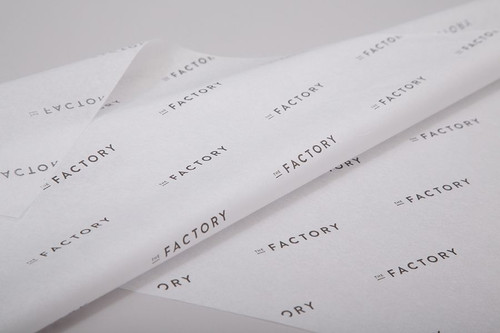Tissue Paper: To Recycle or Compost?
Posted By on Sep 22nd 2024
Being more sustainable can sometimes be challenging. As you become more conscious about your choices, you realize that things like the recyclability and compostability of materials are much more nuanced than you’d like them to be. The same goes with tissue paper.
Most tissue paper on the market (including EcoEnclose tissue paper) is labeled recyclable. But that doesn’t guarantee that all recycling centers will accept it. So, what does this mean, and what should you do with the tissue paper you or your customers receive in gift bags or shipping boxes? Here’s our guide.

Is Tissue Paper Recyclable
Like almost all recycling questions, the answer is “it depends” and “follow the rules set by your local recycler."
Technically, tissue paper, like all paper, is recyclable as long as it is free from contaminants such as foil and glitter. It can be repulped and turned back into another form of paper.
However, for a municipality or waste management provider to accept any category of items for recycling, the provider must have the infrastructure to sort the material and access to profitable markets where it can sell it.
Tissue paper (whether virgin or 100% recycled) is a low-grade material. Because of this, it isn’t always easy for recyclers or MRFs (materials recovery facilities) to find buyers willing to pay for it. Additionally, it’s thin and flimsy. Some recyclers struggle to properly sort the material, depending on their sorting equipment and processes. Due to these nuances, certain recyclers will not accept tissue paper, even if it’s labeled as recyclable.
The good news is that tissue paper is accepted at many industrial compost facilities and can be home-composted as long as it is free of foil and glitter. Unadorned tissue paper can be a healthy addition to a compost pile because it absorbs excess moisture from food waste and bioplastics.
Is Tissue Paper Compostable?
When your local municipality does not accept tissue paper for recycling, your next best option to keep the material out of the landfill is to compost it. However, when composting tissue paper, please ensure it has no foil, glitter, or shiny coating.
If your tissue has any of these contaminants, it will be sorted out of the composting line, or (more likely and much more problematically) they will end up in the final compost product, which will then end up in the soil.

Allowing these contaminants into compost is a significant environmental hazard and directly places microplastics and other synthetics into our soils. It also degrades the output produced by the local composting operation, making it difficult for them to successfully sell their product at the price they need to stay afloat.
Additionally, we recommend that tissue with full-coverage printing is not composted. While flood-coat printed tissue paper may not carry microplastics and may even be cleared by a certifying body for composting, the (often toxic) pigments still end up in the compost and, ultimately, in our soils. Recycling is the best option for this type of tissue, and if it can’t be recycled, it should be sent to the landfill instead.
We strongly recommend that eCommerce brands who want to incorporate tissue into their packaging avoid flood-coated or dyed tissue paper and any tissue paper containing toner inks, glitter, and other elements. This is to ensure your customers can recycle your tissue paper in their municipality when feasible or compost it if it’s not.
Is Tissue Paper Biodegradable?
The terms "compostable" and "biodegradable" refer to materials' ability to break down, but they have distinct meanings.
Tissue paper without foil, glitter, or shiny coating is naturally biodegradable. We use this term to describe packaging that, if left as litter in the land or ocean, would biodegrade in a reasonable period and, therefore, does not contribute to ocean plastic pollution.
Naturally biodegradable items are also compostable, though we strongly recommend recycling over composting for eCommerce packaging. As noted above, tissue paper can be composted if your local municipality does not accept tissue paper for recycling. Ensure tissue paper that is headed for the compost bin has no foil, glitter, or shiny coating.
How to Provide Tissue Paper End-of-Life Guidance To Your Customers
If you plan on incorporating tissue paper into your eCommerce packaging strategy, avoid blanket statements such as “Our tissue paper is 100% recyclable.” Instead, say something like, “Recyclable. Check with your local facilities. Compost if tissue recycling is not available in your area.”
The recyclability of tissue paper can vary county by county. For example, if you ship to someone in Boulder County, Colorado (where EcoEnclose is located), residents and businesses are asked to landfill their tissue paper. If you ship just north of us in Larimer County, residents are asked to recycle it. Similarly, San Francisco residents are asked to compost their tissue paper, while Austin, Texas, residents are asked to recycle it.
Of course, the best end-of-life scenario is reuse. Reusing tissue paper is excellent for crafts, wrapping linens or other household goods, or forting. Be creative with your messaging, and encourage your customers to find additional ways to manage their tissue paper waste.
Finding the Most Sustainable Tissue Paper
Although tissue paper’s end of life depends on where someone lives more than the tissue itself, sustainable consumers or brands should still look for the most eco-friendly tissue paper possible. This will improve the chances that their tissue paper will end up recycled or composted; at the very least, they’ll be able to compost their tissue at home.
Seek out tissue paper that is:
- Made with 100% recycled content and as much post-consumer waste as possible.
- Made without foil, glitter, or other synthetic additions.
- Printed with water or soy-based inks and flexographic or offset printing technology, altogether avoiding digital toner printing.
EcoEnclose tissue paper is made with 100% recycled content, including 20% post-consumer waste. It is also pH-neutral, processed chlorine-free, FSC® certified, and sourced from Seaman Paper, which holds FSC® Chain-of-Custody certification. Our eco-designed and custom tissue paper is printed with water-based ink, which allows our customers to enjoy the benefits of custom branding alongside environmental considerations.
What About SpiroPack Nest Eco?
EcoEnclose also offers SpiroPack Nest Eco—a spiral tissue paper void fill, as a unique and sustainable alternative to traditional crinkle fill and packing peanuts.
SpiroPack Nest Eco is made of 100% recycled materials (95% recycled materials if you choose the white version). It is also FSC® certified, recyclable, and, as an entirely paper-based solution, is readily compostable.
Most recyclers won't accept shredded paper, but many will accept SpiroPack because of its unique design - its clean and contiguous cut spirals eliminate dust and mess, and the paper remains attached in spiral form. When municipalities cannot accept SpiroPack due to the width of its cuts or how thin it is, the next best option to keep SpiroPack Nest Eco out of the landfill is to compost it.
SpiroPack has important environmental benefits beyond its recyclability and compostability. Its shape creates more void-fill volume, meaning you can use less packaging with the same protection. Although it cannot carry custom branding like tissue paper, the nest aesthetic can still offer your customers a beautiful and unique unpacking experience.
End-of-Life Guidance For eCommerce Packaging
About EcoEnclose
EcoEnclose is the leading sustainable packaging company that provides eco-packaging solutions to the world’s most forward-thinking brands.
We develop diverse, sustainable packaging solutions that meet our rigorous research-based standards and customers’ goals. We drive innovative packaging materials to market and consistently improve the circularity of existing solutions.




